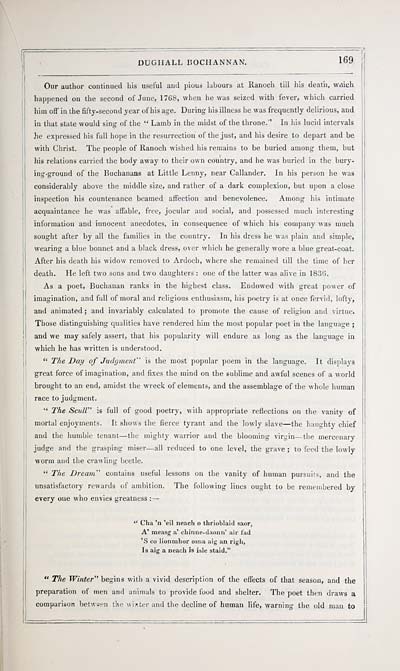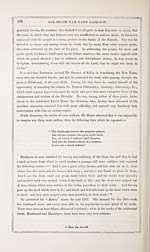Blair Collection > Sar-obair nam bard gaelach, or, The beauties of Gaelic poetry, and lives of the Highland bards
(245)
Download files
Complete book:
Individual page:
Thumbnail gallery: Grid view | List view

DUGHALL BOCHANNAN.
169
Our author continued his useful and pious labours at Ranoch till his deatli, Wiiich
happened on the second of June, 1768, when he was seized with fever, which carried
him off in the fifty-second year of his age. During his illness he was frequently delirious, and
in that state would sing of the " Lamb in the midst of tlie tlirone." In his lucid intervals
he ex])ressed his full hope in the resurrection of the just, and his desire to depart and be
with Christ. The people of Ranoch wished his remains to be buried among them, but
his relations carried the body away to their own country, and ho was buried in the bury-
ing-ground of the Buchanans at Little Lenny, near Callander. In his person he was
considerably above the middle size, and rather of a dark complexion, but upon a close
inspection his countenance beamed affection and benevolence. Among his intimate
acquaintance he was affable, free, jocular and social, and possessed muoli interesting
information and innocent anecdotes, in consequence of which his company was much
sought after by all the families in the country. In his dress he was plain and simple,
wearing a blue bonnet and a black dress, over which he generally wore a blue great-coat.
After his death his widow removed to Ardoch, where she remained till the time of her
death. He left two sons and two daughters : one of the latter was alive in 1836.
As a poet, Buchanan ranks in the highest class. Endowed with great power of
imagination, and full of moral and religious enthusiasm, his poetry is at once fervid, lofty,
and animated ; and invariably calculated to promote the cause of religion and virtue.
Those distinguishing qualities have rendered him the most popular poet in the language ;
and we may safely assert, that his popularity will endure as long as the language in
which he has written is understood.
" T/ie Day of Judgment" is the most popular poem in tlie language. It displays
great force of imagination, and fixes the mind on the sublime and awful scenes of a world
brought to an end, amidst the wreck of elements, and the assemblage of the whole Iiuman
race to judgment.
•' The Scull" is full of good poetry, with appropriate reflections on the vanity of
mortal enjoyments. It shows the fierce tyrant and the lowly slave — the haughty chief
and the humble tenant — the mighty warrior and the blooming virgin — the mercenary
judge and the grasping miser — all reduced to one level, the grave ; to feed the lowly
worm and the crawling beetle.
" The Dream" contains useful lessons on the vanity of human pursuiis, and the
unsatisfactory rewards of ambition. The following linos ouglit to be reiiiembered by
every one who envies greatness :—
" Cha 'n 'eil neacli o thrioblaid saor,
A' measg a' chinne-daonn' air fad
*S CO Honrahor osiia :iig an righ,
Is aig a iieach is i^le staid."
" The Winter" begins with a vivid description of the effects of that season, and the
preparation of men and animals to provide food and shelter. The poet then draws a
comparison between the winter and the decline of human life, warning the old man to
169
Our author continued his useful and pious labours at Ranoch till his deatli, Wiiich
happened on the second of June, 1768, when he was seized with fever, which carried
him off in the fifty-second year of his age. During his illness he was frequently delirious, and
in that state would sing of the " Lamb in the midst of tlie tlirone." In his lucid intervals
he ex])ressed his full hope in the resurrection of the just, and his desire to depart and be
with Christ. The people of Ranoch wished his remains to be buried among them, but
his relations carried the body away to their own country, and ho was buried in the bury-
ing-ground of the Buchanans at Little Lenny, near Callander. In his person he was
considerably above the middle size, and rather of a dark complexion, but upon a close
inspection his countenance beamed affection and benevolence. Among his intimate
acquaintance he was affable, free, jocular and social, and possessed muoli interesting
information and innocent anecdotes, in consequence of which his company was much
sought after by all the families in the country. In his dress he was plain and simple,
wearing a blue bonnet and a black dress, over which he generally wore a blue great-coat.
After his death his widow removed to Ardoch, where she remained till the time of her
death. He left two sons and two daughters : one of the latter was alive in 1836.
As a poet, Buchanan ranks in the highest class. Endowed with great power of
imagination, and full of moral and religious enthusiasm, his poetry is at once fervid, lofty,
and animated ; and invariably calculated to promote the cause of religion and virtue.
Those distinguishing qualities have rendered him the most popular poet in the language ;
and we may safely assert, that his popularity will endure as long as the language in
which he has written is understood.
" T/ie Day of Judgment" is the most popular poem in tlie language. It displays
great force of imagination, and fixes the mind on the sublime and awful scenes of a world
brought to an end, amidst the wreck of elements, and the assemblage of the whole Iiuman
race to judgment.
•' The Scull" is full of good poetry, with appropriate reflections on the vanity of
mortal enjoyments. It shows the fierce tyrant and the lowly slave — the haughty chief
and the humble tenant — the mighty warrior and the blooming virgin — the mercenary
judge and the grasping miser — all reduced to one level, the grave ; to feed the lowly
worm and the crawling beetle.
" The Dream" contains useful lessons on the vanity of human pursuiis, and the
unsatisfactory rewards of ambition. The following linos ouglit to be reiiiembered by
every one who envies greatness :—
" Cha 'n 'eil neacli o thrioblaid saor,
A' measg a' chinne-daonn' air fad
*S CO Honrahor osiia :iig an righ,
Is aig a iieach is i^le staid."
" The Winter" begins with a vivid description of the effects of that season, and the
preparation of men and animals to provide food and shelter. The poet then draws a
comparison between the winter and the decline of human life, warning the old man to
Set display mode to: Large image | Transcription
Images and transcriptions on this page, including medium image downloads, may be used under the Creative Commons Attribution 4.0 International Licence unless otherwise stated. ![]()
| Early Gaelic Book Collections > Blair Collection > Sar-obair nam bard gaelach, or, The beauties of Gaelic poetry, and lives of the Highland bards > (245) |
|---|
| Permanent URL | https://digital.nls.uk/81870808 |
|---|
| Description | A selection of books from a collection of more than 500 titles, mostly on religious and literary topics. Also includes some material dealing with other Celtic languages and societies. Collection created towards the end of the 19th century by Lady Evelyn Stewart Murray. |
|---|
| Description | Selected items from five 'Special and Named Printed Collections'. Includes books in Gaelic and other Celtic languages, works about the Gaels, their languages, literature, culture and history. |
|---|

